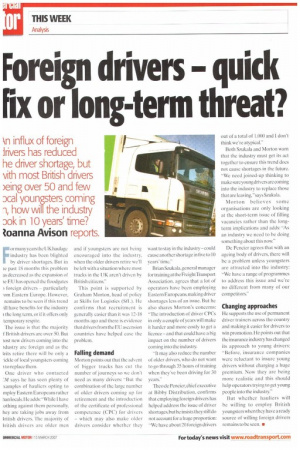Foreign drivers quick fix or long-term threat?
Page 22

If you've noticed an error in this article please click here to report it so we can fix it.
n influx of foreign irivers has reduced he driver shortage, but vith most British drivers )eing over 50 and few Dcal youngsters coming n, how will the industry Dok in 10 years' time?
toanna Avison reports.
Formanyyears the UK haulage industry has been blighted by driver shortages. But in le past 18 months this problem as decreased as the expansion of le Fil has opened the floodgates ) foreign drivers — particularly -om Eastern Europe. However, remains to be seen if this trend al have benefits for the industry 1 the long term, or if it oilers only temporary respite.
The issue is that the majority I British drivers are over 50. But lost new drivers coming into the idustry are foreign and as the lrits retire there will he only a lick le of local youngsters coming 1 to replace them.
One driver who contacted :M says he has seen plenty of xamples of hauliers opting to mploy Eastern Europeans rather han locals. He acids: While I have .othing against them personally, hey are taking jobs away from 3ritish drivers. The majority of 3ritish drivers are older men and if youngsters are not being encouraged into the industry, when the older drivers retire we'll be left with a situation where most trucks in the IJK aren't driven by British citizens."
This point is supported by Graham Morton, head of policy at Skills for Logistics (SfL). He confirms that recruitment is generally easier than it was 12-18 months ago and there is evidence that drivers from the Eli ascension countries have helped ease the problem.
Falling demand
Morton points out that the advent of bigger trucks has cut the number of journeys so we don't need as many drivers: "But the combination of the large number of older drivers coming up for retirement and the introduction of the certificate of professional competence (CPC) for drivers — which may also make older drivers consider whether they want to stay in the industry—could cause another shortage in five to 10 years' time."
Brian Szukala,general manager for training at the FreightTransport Association, agrees that a lot of operators have been employing Eastern Europeans, making driver shortages less of an issue. But he also shares Morton's concerns: "The introduction of driver CPCs in only a couple of years will make it harder and more costly to get a licence — and that could have a big impact on the number of drivers coming into the industry.
"It may also reduce the number of older drivers, who do not want to go through 35 hours of training when they've been driving for 30 years."
Theo de Pencier,chief executive at Bibby Distribution, confirms that employing foreign drivers has helped address the issue of driver shortages. hut he insists they still do not account for a huge proportion: "We have about 20 foreign drivers out of a total of 1,000 and I don't think we're atypical."
Both Szukala and Morton warn that the industry must get its act together to ensure this trend does not cause shortages in the future. "We need joined-up thinking to make sure young drivers are coming into the industry to replace those that are leaving," says Szukala.
Morton believes some organisations are only looking at the short-term issue of filling vacancies rather than the longterm implications and adds: As an industry we need to be doing something about this now" De Fender agrees that with an ageing body of drivers, there will be a problem unless youngsters are attracted into the industry: "We have a range of programmes to address this issue and we're no different from many of our competitors."
Changing approaches
He supports the use of permanent driver trainers across the country and making it easier for drivers to win promotion. He points out that the insurance industry has changed its approach to young drivers: "Before, insurance companies were reluctant to insure young drivers without charging a huge premium. Now they are being more realistic and this should help operators trying to get young people into the industry."
But whether hauliers will be willing to employ British youngsters when they have a ready source of willing foreign drivers remains to be seen. •


























































































































































































